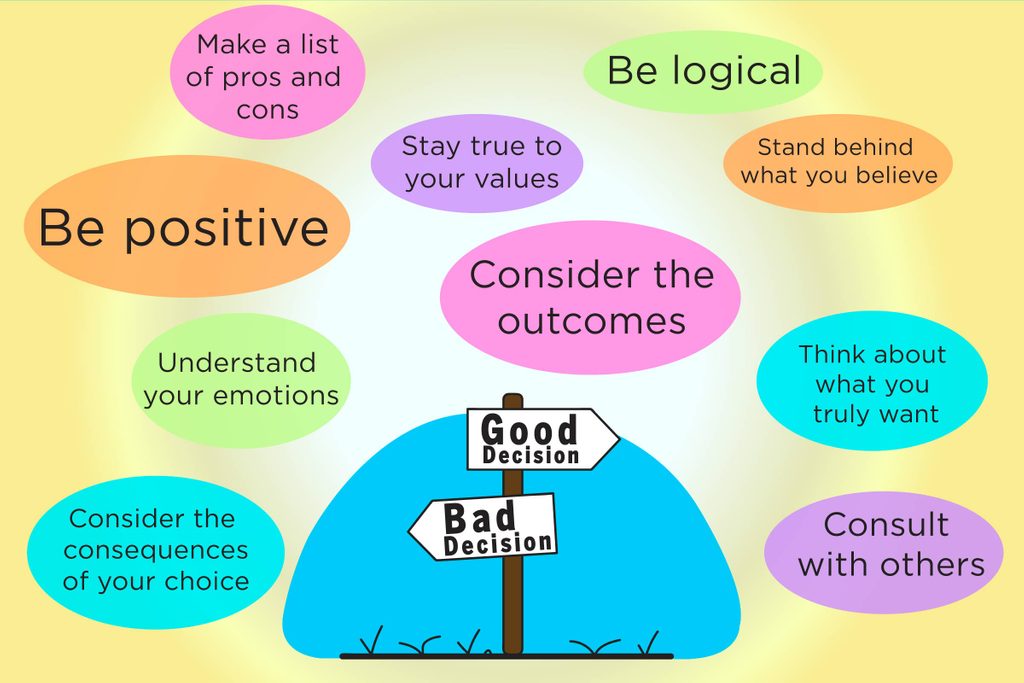10 Proven Ways to Make Better Decisions
Updated: Jun. 19, 2017
Follow this advice, and your life can change for the better.
Consider the consequences of your choice
When faced with a tempting choice, new research published in Psychological Science suggests that framing the choice as a sequence of events can help you imagine the future. Imagining future consequences may be a useful strategy, the researchers noted, when circumstances are less than ideal–say, when you’re multitasking, distracted, stressed, or just tired. “People often have difficulty forgoing immediate temptations, like hitting the snooze button on the alarm, for the sake of later benefits. One possible reason is that people tend to consider the immediate consequences of a particular action, like getting a few more minutes of sleep, more than the later ones, like not having time for breakfast,” explains study author Adrianna Jenkins of the Helen Wills Neuroscience Institute and Haas School of Business at the University of California, Berkeley. By visualizing the consequences of an action in advance, this can help in the best choice.
Understand your emotions
Because decisions are so personal, they are fueled by our own feelings, our relationships to others, and outside powers, Professor Francesca Gino, a professor of psychology at Harvard told the New York Times. One suggestion is to tap into your immediate feelings when faced with decisions. “Take your emotional temperature. Try to be more aware of where your emotions are coming from and how, even if seemingly irrelevant, they may be clouding your decision,” Professor Gino suggests in the article.
Keep fear in perspective
Try to maintain a positive outlook and don’t be too fearful. Research shows that we tend to have greater regrets about decisions that have gone wrong when we feel we approached the subject without looking into it deeply enough or considering enough options, said Terry Connolly, a professor of management and organizations at the University of Arizona, to the New York Times.
Weigh the pros and cons
Approach the decision with an “old-school” pros and cons list that you write down, suggests Allen Klein, MA, CSP, author of You Can’t Ruin My Day: 52 Wake-Up Calls to Turn Anything Around. “With a line drawn down the middle of the page, on the left side, list the positive things about what you are debating about achieving and on the right side list any negative things that would potentially occur if you made the decision,” Klein says. Also, take your time to consider the options. “Spend as much time as you need, anywhere from a few minutes to a few days, writing down positive or negative thoughts related to the decision.” After you feel your list is as complete as it can be, circle the three most important things in each column; three things that jump out at you. “Then compare each of the three to each other,” says Klein. “What I have found is that an answer immediately appears as the items in one column outweigh the other.”
Stay true to your values
When deciding between two courses of action, Elizabeth McCourt, a leadership coach based in Westhampton Beach, New York, states the most important thing she advises her clients is to make decisions based on their personal values. “Once someone can articulate what is most important to them, be it integrity, family, science, adventure, this will help them to have clarity,” she says. “By doing so, one takes the opportunity to ‘notice’ both how they feel and how they want to process decisions. We can logically plod along and make calculated decisions, but when someone can really articulate what’s important to them as well as their situation, there will be more clarity.”
Keep worrying in check
Decision making is often quite challenging for people who struggle with anxiety disorders due to excessive concerns about the negative consequences of making a “bad” decision. Joel Minden, PhD, clinical psychologist in Chico, California, says an example could be anxiety related to taking a vacation may result from worrying about whether the flight will be too long, uncomfortable, or expensive. “Although it can be productive to consider these outcomes and then devote some time to researching the best flight options, it can be unproductive to worry so much about ‘what if’ scenarios that you end up not leaving town at all,” he says.
Be logical
Mike Bishop, a psychologist and executive director of Summerland Camps, a program which helps youngsters make better life decisions, recommends making an emotional decision based on logical factors. “A decision balance sheet is an effective tool. For example, in making a purchase decision write down all the factors that are important to you. This might be price, quality, reviews, or any relevant factor. Then, assign a number from one to ten for each item. Compare with several brands then add up the value,” he says. “This way we can quantify each subjective factor and make an objective, fact-based decision.”
Follow your integrity
According to an article in Forbes, doing the right thing can be the best choice. “Standing behind what one believes is the right decision in the face of tremendous controversy is the stuff great leaders are made of,” the article says. “There are many areas where compromise yields significant benefits, but your value system, your character, or your integrity should never be compromised.”
Think about what you truly want
Knowing the best decision is part of realizing that you will be satisfied with either option. If there are only two choices, be sure you would be happy with one or the other. “The real reason someone might be unable to make up his mind is neither option is what he really wants,” explains an article in Inc.
Consult with those in your inner circle
Some of the most common decisions people solicit advice from loved ones about include whether to relocate, change careers, end or begin relationships, have children or get married, Anita McLean, a clinical psychologist based in Princeton, New Jersey, told the Chicago Tribune. Because our relationships form such a critical fabric of our lives, it’s not only impossible to make a big decision without thinking of others, but it can be downright unhealthy,” Holly Parker, a lecturer of psychology at Harvard University, adds, “What ultimately matters is how much we allow others to impact our decision and why.”

